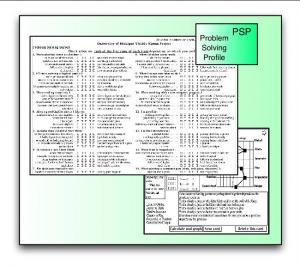
The Problem Solving Profile (PSP) is a tool to help evaluate and/or assess instructional projects or courses that may have technology components or are technology enabled.
The PSP contains questionnaires of one page length, or a short web survey, that measures proclivities of problem solving styles that learners exhibit.
This site contains PowerPoint presentations on the use of the PSP, sample PSP's, research papers on the use of the PSP and a Frequently Asked Question page (FAQ).
The PSP has been used at the University of Michigan since the early 1990s and has been used for determining groups of learners problem solving profiles and then using the information to help modify and improve learning processes. It has been used in evaluating:
- Distance learning in business administration
- Teacher education computer competencies
- Distance learning in nursing and midwifery and
- Advanced research methods courses in designing evaluation for new technology in instruction
Author: Carl Berger
Structure: Assessment Tool
Instructions
About the Problem Solving Profiles (PSP)
Questions
- What can I learn about my research subjects by using PSP?
- Why 5 themes?
- How can I design new themes?
- After I learn about my students' learning styles (or intelligences), should I mix and match them?
- Can I measure differences between students in the same group (intra-group differences) as well as between groups (inter-group differences)?
- When should I give the survey to my students?
- What about Human Subjects Review?
Answers
- What can I learn about my research subjects by using PSP?
PSP can help researchers and educators to investigate individual student's learning preference, such as learning styles or different kinds of intelligence. The goal is to help educators design teaching approaches and materials to meet students' needs. - Why 5 themes?
Five themes allow researchers to study five different aspects of learning or intelligence by conducting one single survey. If too many themes are studied at one time, each theme then describes a very narrow aspect of learning. The results may indicate very little overlap between students. That is, each student becomes a style of its own. Researchers then lose the ability to cluster students into major categories. - How can I design new themes?
You can create new themes by employing theories or applying results of observation. Theories such as Dr. Howard Gardner's Multiple Intelligences and Kolb's theory of Learning Styles (see links under "Reading List") provide major categories for characterizing learning. By observing classroom practices or interviewing teachers and students, researchers can also create new themes designed for a specific learning environment or student demographics. - After I learn about my students' learning styles (or intelligences), should I mix and match them?
No. Gaining more insight into students' learning styles does not mean that you need to match instructional materials with the styles. Research in the past indicated that teaching approaches can alter learning styles and learning styles may change over time. Each learning style benefits students differently and some may appear more efficient than others for learning different content. Being aware of students' current learning styles help educators to introduce and emphasize the less familiar styles. The ultimate goal is to help students take advantage from all different styles and the learning methods. Rather than matching intructional materials to one or two dominant learning styles, educators should provide a wide range of learning resources encouraging students to explore new styles. - Can I measure differences between students in the same group (intra-group differences) as well as between groups (inter-group differences)?
Yes. Multidimesional analysis is good for clustering students in the same group and discriminate function analysis is good for distinguishing different groups (e.g., students from different disciplines or different years). - When should I give the survey to my students?
You can give the survey to the students at any time of the semester. However, keep in mind that learning styles may change over time and may be influenced by teaching styles. - What about Human Subjects Review
We believe that the work you might do with the PSP is for course or work improvement and not research into human behavior. That may be splitting hairs and you, as we have, should follow strict human subjects review guidlines. Thus, participants must have informed consent, be able to withdraw at any time and know that their information will be kept confidential and shared only as aggregate data and they will never be identified.
Please go to the section on Human Subjects for more information.
Reading List
- Introduction of the theory of Multiple Intelligences (Thirteen Ed Online) (http://www.thirteen.org/edonline/concept2class/month1/, 01-18-2004). This nicely designed website provides a quick overview of the theory and application of Dr. Howard Gardner's Multiple Intelligences. A bibliography list is provided.
- Articles about Multiple Intelligences (New Horizons for Learning) (http://www.newhorizons.org/strategies/mi/front_mi.htm, 01-18-2004) This website provides links to articles about Multiple Intelligences including excerpts of Dr. Gardner's Seven Steps to Intelligence and other researchers' intepretation.
- Kolb's theory of learning styles (http://www.businessballs.com/kolblearningstyles.htm). A quick overview of Kolb's four different learning styles.
- Other classification of learning styles (http://nwlink.com/~donclark/hrd/styles.html 01-26-2004). Learn more about Vision, Auditory, and Kinesthetic (VAK) learning style and Myers Briggs Type Indicator (MBTI).
- Learning Styles are Mutable (http://www-personal.umich.edu/~cberger/psi76.html, 02-04-2004). A "golden oldie" showing that teachers Kolb learning styles may be modified by the activity in which they are engaged.
About the Creators

Carl Berger
Carl Berger is Professor and Dean Emeritus at the University of Michigan, School of Education.
Carl was the Director of Advanced Academic Technologies in the Collaboratory for Advanced Research and Academic Technologies (CARAT) in the Provost's Office since its inception in 1995 through 2005. Prior to that he was a professor at the University for over 33 years and associate dean and dean from 1979 through 1988.
Research projects include design and evaluation on the CoLabNet Project, CARAT/Rackham fellowship evaluation. He was the major designer and analyst of the Surveys of Information Technology Use by Faculty and Students at the University for over 20 years. In addition to work on evaluation and assessment of student and faculty use of technology, he works on displaying research data in colorful graphic and network forms for ease of analysis and decision making.
Professional activies include editor at large of Academic Intersections, member of the advisory board of MERLOT, former Chairman of the Board of IMS Global Learning Consortium, from its inception in 1995 to 2004, member of the board of directors of the New Media Centers from 1994 to 1998 and member of EDUCAUSE Center for Applied Research, The EDUCAUSE Learning Initiative and the National Association for Research in Science Teaching.
He was awarded the National Association for Research in Science Teaching Distinguished Service Award in 1996, the EDUCAUSE Leadership in Information Technology Award in 2001, the MERLOT Distinguished Service Award in 2003, Apple Distinguished Educator in 2004 and In June 2006 he was named the New Media Consortium Fellow for outstanding lifetime achievement.

Jump to:
| Document Title | Creator | Downloads | License |
|---|---|---|---|
|
Defining Individuals’ Learning Styles in a Technology-Enhanced Learning Environment |
Carl Berger
Silvia Wen-Yu
Neil Skov
Deborah Walker
|
| Document Title | Creator | Downloads | License |
|---|---|---|---|
|
Sample PSP used for First Year Medical Students |
Carl Berger
|
| Document Title | Creator | Downloads | License |
|---|---|---|---|
|
Lecture 1: How to Design a PSP Survey |
Carl Berger
|
||
|
Lecture 2: How to Analyze PSP Data |
Carl Berger
|


